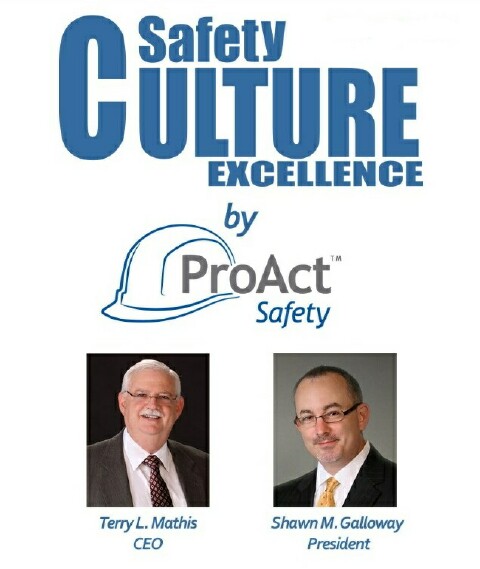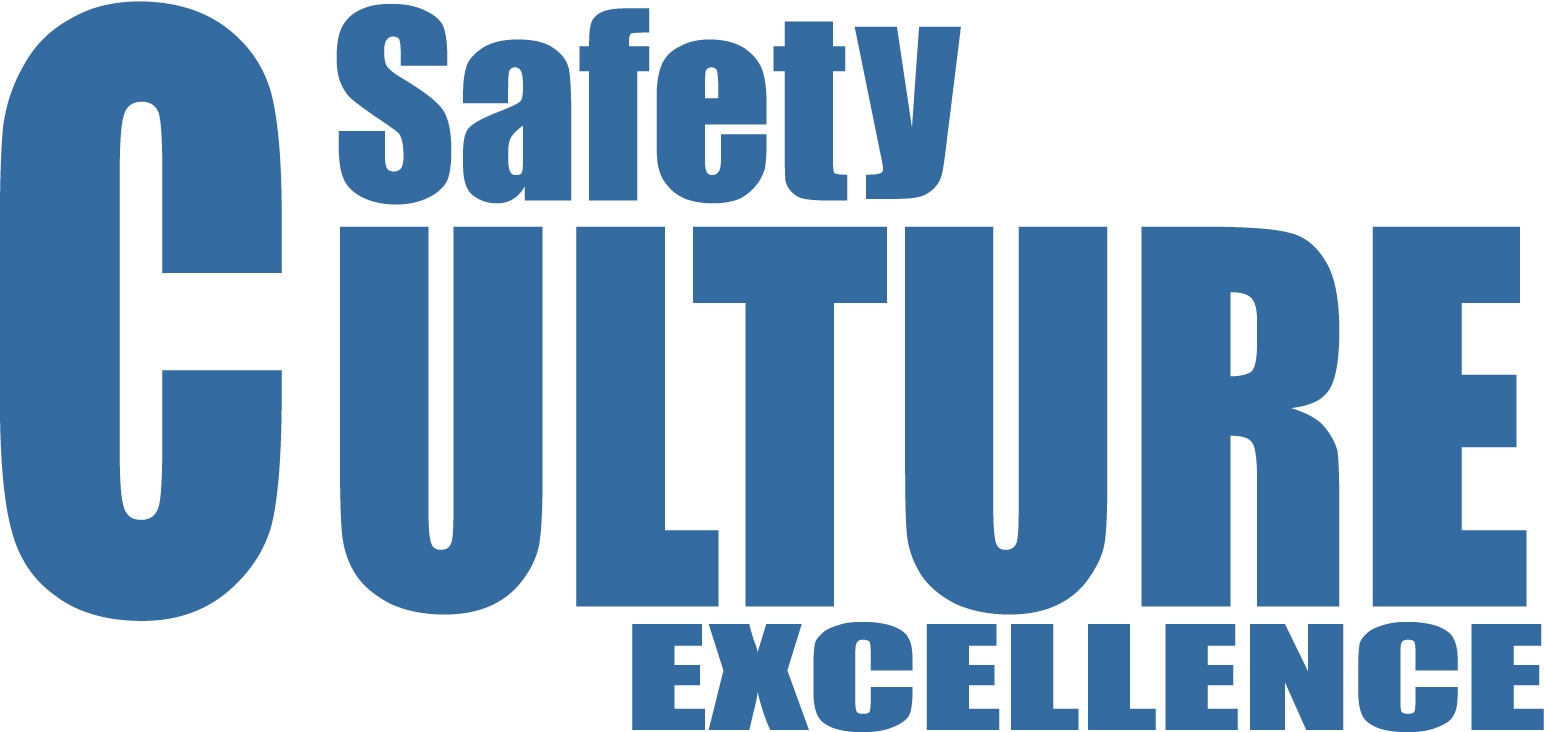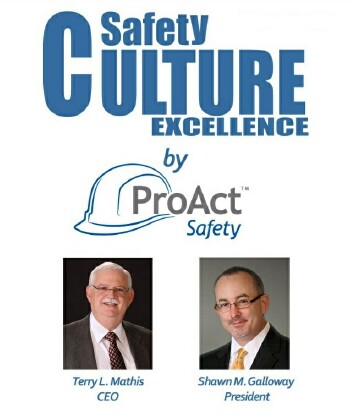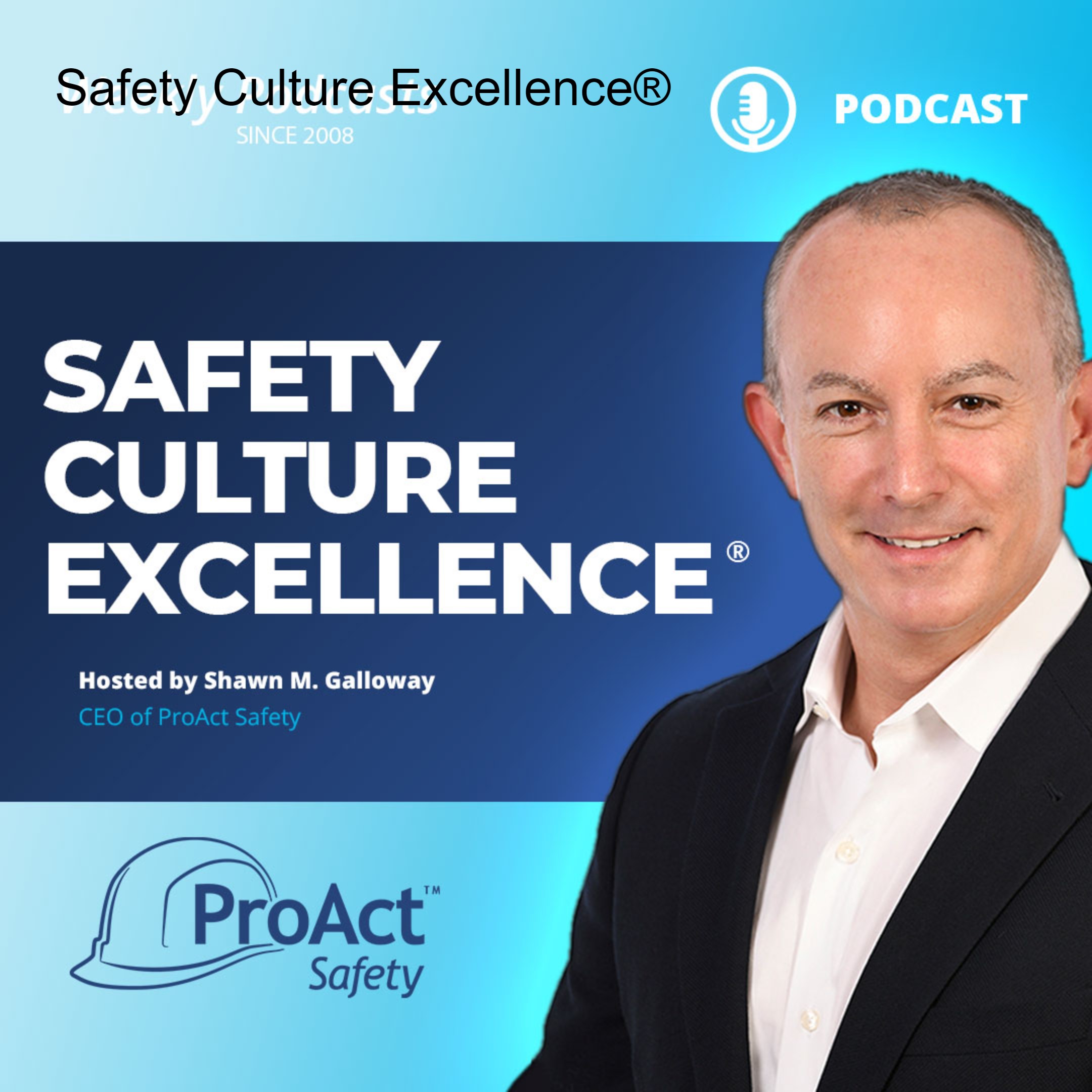Episodes

Monday Aug 25, 2014
351 - The Mindset of Safety Excellence
Monday Aug 25, 2014
Monday Aug 25, 2014
Greetings everyone, this podcast recorded while in Auburn Hills, MI. I’d like to share an article I wrote that was published in the August 2014 edition of BIC Magazine. The published article can either be found on the magazine’s website or under Insights at www.ProActSafety.com.
I hope you enjoy the podcast this week. If you would like to download or play on demand our other podcasts, please visit the ProAct Safety’s podcast website at: http://www.safetycultureexcellence.com. If you would like access to archived podcasts (older than 90 days – dating back to January 2008) please visit www.ProActSafety.com/Store. For more detailed strategies to achieve and sustain excellence in performance and culture, pick up a copy of our book, STEPS to Safety Culture Excellence - http://proactsafety.com/insights/steps-to-safety-culture-excellence
Have a great week!
Shawn M. Galloway
ProAct Safety

Thursday Aug 07, 2014
Upcoming Free Webinar: 3 Building Blocks For An Excellent Safety Culture
Thursday Aug 07, 2014
Thursday Aug 07, 2014
There is an increasing amount of talk about safety culture with very few real, implementable tactics that outline how to create a culture of safety excellence, and sustain it.
For the first time ever, leveraging the expertise of Canada’s Greg Ford of TalentClick and The United States’ Shawn M. Galloway of ProAct Safety, a free one-of-a-kind webinar will occur on the 24th of September, 2014.
This webinar will be a one a unique and revolutionary exploration into what both industry leaders (with different backgrounds, approaches and client experiences) have found to be the three most important building blocks of safety culture improvement. Safety culture has never been explored, developed, measured and understood like this before.
Greg Ford is the CEO of TalentClick Workforce Solutions. He is passionate about helping organizations eliminate incidents. He is committed to empowering people with “safety self-awareness” so they get home safely at the end of the day. Born in a blue-collar town and raised in a working-class family, Greg has a degree in Psychology and a Masters in Adult Education & Workplace Learning. He is CEO and co-founder of TalentClick and an adjunct professor at Simon Fraser University in Vancouver, Canada.
Greg’s articles have been published in numerous magazines and journals such as Workplace Today, Canadian HR Reporter, People Talk, Mining Weekly, Oil & Gas Monthly and others. He is a member of the Canadian Association of Professional Speakers and has spoken throughout North America.
Shawn M. Galloway is the President of ProAct Safety and coauthor of two books, his latest is STEPS to Safety Culture Excellence. He is one of the top speakers for American Society of Safety Engineers. National Safety Council calls him a “Global safety excellence expert” and a “Top-rated speaker” and listed him in the 2013 Top 40 Rising Stars.
He continues to be recognized by industry magazines as one of the most influential EHS leader and safety excellence expert. In addition to the books, hundreds of podcasts, articles and videos he is also the host of the highly acclaimed weekly podcast series, Safety Culture Excellence and a columnist for several magazines.
I hope you will join us for this exciting event!
Link to event: http://tinyurl.com/pu3axfn

Wednesday Aug 06, 2014
Through the Eyes of the Contractor
Wednesday Aug 06, 2014
Wednesday Aug 06, 2014
How many safety professionals who manage contractor relations have ever been contractors themselves? Is safety different for contractors than it is for regular employees? Anyone asking these questions is thinking but probably does not have the answers. YES! Safety is different for contractors and those who try to manage it as though it were not quickly lose credibility.
That does not mean contractors will not placate them and try to make them happy. It simply means that their directives may be dramatically unrealistic and obviously out of touch with the reality of the task at hand. The sad truth is that safety is not an abstract construct that is universally applicable.
True safety is highly in tune with the realities of the job, the worker and the workplace. Safety guidelines that ignore these realities flash a neon light that says “Out of Touch” and labels the originator of them as a complete outsider who is clueless even if the person in charge. Savvy safety professionals seek out these realities and remain flexible. Remember the old saying, “In theory, there is no difference between theory and practice. In practice, there is!”
-Terry L. Mathis
For more insights, visit www.ProActSafety.com
Terry L. Mathis is the founder and CEO of ProAct Safety, an international safety and performance excellence firm. He is known for his dynamic presentations in the fields of behavioral and cultural safety, leadership, and operational performance, and is a regular speaker at ASSE, NSC, and numerous company and industry conferences. EHS Today listed Terry as a Safety Guru in ‘The 50 People Who Most Influenced EHS in 2010, 2011 and 2012-2013. He has been a frequent contributor to industry magazines for over 15 years and is the coauthor of STEPS to Safety Culture Excellence, 2013, WILEY.

Wednesday Jul 30, 2014
Transformational Leadership in Safety
Wednesday Jul 30, 2014
Wednesday Jul 30, 2014
Safety leaders are regularly looking for ways to improve safety, or are they? All too many leaders would settle for maintaining the status quo or managing to fail a little less this year than last. It is not that they would not like to make a truly transformational improvement in safety. They simply either don’t think it is possible or don’t have a plan to make it happen.
The beginning of a transformation in safety is to quit trying to control workers and start adding value to them. Workers may sometimes be the problem but they are also the solution. Helping workers perform more safely is different than controlling them. The whole terminology of “safety controls” loses its effectiveness when it moves from conditional controls to behavioral controls.
Transformation begins with winning hearts and minds over to safety excellence and providing the support to enable their efforts. Safety becomes a life ambition and not a game that needs rules to keep people from cheating. The hands and feet of workers only need to be controlled when their hearts and minds are not bought in and fully engaged in the safety effort.
-Terry L. Mathis
For more insights, visit www.ProActSafety.com
Terry L. Mathis is the founder and CEO of ProAct Safety, an international safety and performance excellence firm. He is known for his dynamic presentations in the fields of behavioral and cultural safety, leadership, and operational performance, and is a regular speaker at ASSE, NSC, and numerous company and industry conferences. EHS Today listed Terry as a Safety Guru in ‘The 50 People Who Most Influenced EHS in 2010, 2011 and 2012-2013. He has been a frequent contributor to industry magazines for over 15 years and is the coauthor of STEPS to Safety Culture Excellence, 2013, WILEY.

Wednesday Jul 23, 2014
Outsourcing Leadership Training
Wednesday Jul 23, 2014
Wednesday Jul 23, 2014
Today’s economic realities have necessitated a great deal of outsourcing. Organizations are clinging to their core competencies and value potential and hiring out peripheral tasks. In safety, more and more of the training function is being outsourced. This can be a good approach to some types of safety training but is definitely not for others.
Definite YES: Skills training by technical experts is almost always more effective. If the organization cannot justify keeping such an expert onboard full-time, outsourcing makes good sense and is often quite effective.
Definite NO: Training that establishes official management style or organizational philosophy. If you want your supervisors to coach safety or your leaders to stay on message about organizational mission and vision for safety, outside trainers are definitely not the way. Specific skills such as coaching or communications can be taught by outsiders, but the deep-rooted organizationally-specific style training is best done by an insider with recognized ties to the organization and specific information to answer questions on strategy and tactics.
Maybe with Qualifications: Training that is required for regulatory compliance can often be outsourced effectively. The one nuance is that much of this type of training is very generic and may not be easily or directly applied by workers to their specific tasks. Training that is too theoretical may lose its effectiveness if the link between the theory and workplace reality is not clear.
Outsourcing the right training and keeping the right training in-house can be a key to success in safety.
-Terry L. Mathis
For more insights, visit www.ProActSafety.com
Terry L. Mathis is the founder and CEO of ProAct Safety, an international safety and performance excellence firm. He is known for his dynamic presentations in the fields of behavioral and cultural safety, leadership, and operational performance, and is a regular speaker at ASSE, NSC, and numerous company and industry conferences. EHS Today listed Terry as a Safety Guru in ‘The 50 People Who Most Influenced EHS in 2010, 2011 and 2012-2013. He has been a frequent contributor to industry magazines for over 15 years and is the coauthor of STEPS to Safety Culture Excellence, 2013, WILEY.

Monday Jul 07, 2014
344 - Safety Excellence Focus Trumps Fanaticism
Monday Jul 07, 2014
Monday Jul 07, 2014
Greetings everyone, this podcast recorded while in Denver, CO. I’d like to share an article I wrote that was published June-July 2014 edition of BIC Today Magazine. The published article can either be found on the magazine’s website or under Insights at www.ProActSafety.com.
I hope you enjoy the podcast this week. If you would like to download or play on demand our other podcasts, please visit the ProAct Safety’s podcast website at: http://www.safetycultureexcellence.com. If you would like access to archived podcasts (older than 90 days – dating back to January 2008) please visit www.ProActSafety.com/Store. For more detailed strategies to achieve and sustain excellence in performance and culture, pick up a copy of our book, STEPS to Safety Culture Excellence - http://proactsafety.com/insights/steps-to-safety-culture-excellence
Have a great week!
Shawn M. Galloway
ProAct Safety

Monday Jun 30, 2014
343 - What is Your Safety Elevator Pitch?
Monday Jun 30, 2014
Monday Jun 30, 2014
Greetings everyone, this podcast recorded while in my home in Texas. I’d like to share an article I wrote that was published May 2014 in Professional Safety Magazine. The published article can either be found on the magazine’s website or under Insights at www.ProActSafety.com.
I hope you enjoy the podcast this week. If you would like to download or play on demand our other podcasts, please visit the ProAct Safety’s podcast website at: http://www.safetycultureexcellence.com. If you would like access to archived podcasts (older than 90 days – dating back to January 2008) please visit www.ProActSafety.com/Store. For more detailed strategies to achieve and sustain excellence in performance and culture, pick up a copy of our book, STEPS to Safety Culture Excellence - http://proactsafety.com/insights/steps-to-safety-culture-excellence
Have a great week!
Shawn M. Galloway
ProAct Safety

Monday Jun 23, 2014
342 - Is Winning or Losing a Safety Culture Habit?
Monday Jun 23, 2014
Monday Jun 23, 2014
Greetings everyone, this podcast recorded while in Auburn Hills, MI. I’d like to share an article I wrote that was published May 2014 in Occupational Health & Safety Magazine. The published article can either be found on the magazine’s website or under Insights at www.ProActSafety.com.
I hope you enjoy the podcast this week. If you would like to download or play on demand our other podcasts, please visit the ProAct Safety’s podcast website at: http://www.safetycultureexcellence.com. If you would like access to archived podcasts (older than 90 days – dating back to January 2008) please visit www.ProActSafety.com/Store. For more detailed strategies to achieve and sustain excellence in performance and culture, pick up a copy of our book, STEPS to Safety Culture Excellence - http://proactsafety.com/insights/steps-to-safety-culture-excellence
Have a great week!
Shawn M. Galloway
ProAct Safety

Wednesday May 28, 2014
Success vs. Vulnerability
Wednesday May 28, 2014
Wednesday May 28, 2014
The only problem with a successful safety effort is success. Success can seriously damage the organizational and individual sense of vulnerability necessary for future success. When no accidents happen for a long enough period of time, people can drop their guard. Celebrations of success that don’t include admonishments for renewed effort can lead to workers who are too busy patting themselves on the back to be safe. The age old, “it isn’t going to happen to me” mentality begins to grow and minds start to think their bodies are bulletproof.
Some of the best-performing organizations in safety are the ones where workers come to work each day with a full realization that accidents are possible and waiting. No one lowers their guard because they know the dangers are still there. There is a healthy respect for the possibility of a tragedy and everyone is standing guard to prevent it.
Vulnerability need not reach the panic level, but also cannot be allowed to go completely away, even for moments. Just like disease, accidents are best addressed through early detection and management of risk factors; not through reactive measures to control the damage. Can your organization celebrate success without losing its healthy sense of vulnerability?
-Terry L. Mathis
For more insights, visit www.ProActSafety.com
Terry L. Mathis is the founder and CEO of ProAct Safety, an international safety and performance excellence firm. He is known for his dynamic presentations in the fields of behavioral and cultural safety, leadership, and operational performance, and is a regular speaker at ASSE, NSC, and numerous company and industry conferences. EHS Today listed Terry as a Safety Guru in ‘The 50 People Who Most Influenced EHS in 2010, 2011 and 2012-2013. He has been a frequent contributor to industry magazines for over 15 years and is the coauthor of STEPS to Safety Culture Excellence, 2013, WILEY.

Wednesday May 14, 2014
Starting vs. Stopping
Wednesday May 14, 2014
Wednesday May 14, 2014
Is safety excellence a matter of stopping risks or starting precautions? Should we focus on the “thou shalt nots” of safety, or encourage positive action? This topic directly impacts the question we have discussed before, “Is safety excellence a matter of achieving success or avoiding failure?” But beyond that philosophical point, let’s discuss the tools used for starting and stopping human behavior and their side effects.
The ultimate behavioral stopping tool is punishment. In the behavioral sciences, anything that tends to stop behavior is consider punishment and what makes it effective is the timing and probability. Negative consequences for behavior that are certain and timely tend to stop, or “extinguish” the behavior. But punishment does not automatically start another behavior in its place. Artificially-imposed punishment can also damage relationships and culture. It can be important to stop certain behaviors that present unacceptable risks or damage safety culture, and punishment might be the right tool for that job.
Starting tools for behavior include positive reinforcement and motivation. If the safety challenge is getting workers to identify risks, take precautions or participate in safety activities, these starting tools can be invaluable. Starting tools also are relationship and culture builders. Workers who help each other start better practices and improve performance tend to strengthen the bonds between themselves.
Determining the right tools for safety excellence involves accurately identifying exactly what behaviors need to be stopped or started. An effective safety strategy should include these distinctions.
-Terry L. Mathis
Terry L. Mathis is the founder and CEO of ProAct Safety, an international safety and performance excellence firm. He is known for his dynamic presentations in the fields of behavioral and cultural safety, leadership, and operational performance, and is a regular speaker at ASSE, NSC, and numerous company and industry conferences. EHS Today listed Terry as a Safety Guru in ‘The 50 People Who Most Influenced EHS in 2010, 2011 and 2012-2013. He has been a frequent contributor to industry magazines for over 15 years and is the coauthor of STEPS to Safety Culture Excellence, 2013, WILEY.

